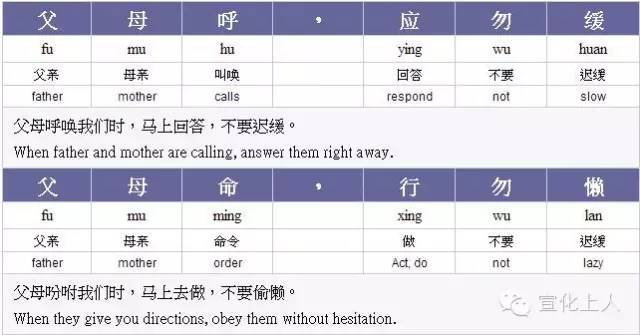
应,读去声,作动词用,回答之意;不可读平声,而解作应该。呼,是高声叫唤:父母或者在远处,或者在别个房间,所以当父母需要我们时,就会提高了声音来叫。假如我们不马上答应,父母或者会以为我们不在,或者会以为我们没听见。于是一叫再叫的,嗓子叫哑了都有可能;再不然就是发起脾气来了!这都很伤健康的。真孝顺的孩子,不会希望父母伤身体,更不会装聋作哑,甚至于被叫烦了,还反过来怪父母。
1.WhenMotherandFatherarecalling,answerthemrightaway.
Whenourparentsarefarawayorinanotherroom,theymaycallouttouswhentheyneedus.Ifwedonotrespondrightaway,theymaythinkthatwearenotaroundorthatwedidnothearthem,andtheywillkeepcallinguntiltheybecomehoarseorlosetheirtemper,neitherofwhichwouldbegoodfortheirhealth.AtrulyFilialchildwouldnotwanthisparentstoruintheirhealthlikethat.Hewouldnotpretendtobedeaformutewhenhisparentscalledhim,andhewouldnotdaretodisobeythemevenifheisannoyedatbeingcalled.
命是当面吩咐,或者是很威严地命令,或者是很和蔼地交待,总之都得赶快去做,不要找藉口,拖拖拉拉的,或是阳奉阴违,当面答应却背后捣鬼;又或者做得心不甘情不愿的,甚至人前,背后发牢骚。这都不可以的。
2.Whentheygiveyoudirections,obeythemwithouthesitation.
Whenourparentstellustodosomething,whethersternlyorgently.weshouldobeythemrightawayandnotlookforexcusestoprocrastinate.Weshouldn'tactobedientinfrontofourparentsbutthendisobeythembehindtheirbacks;norshouldwedothingsinareluctantmannerandkeepcomplaininginfrontofourparentsorbehindtheirbacks.
教,在这里也是个动词,念平声,教导。父母的人生经验比我们丰富,当他们在指导我们怎么待人,处事,接物时,我们都要恭恭敬敬地仔细听明白,牢记在心。不可以当那话是耳边风,看父母像老骨董。所谓“众人是我师,我是众人师。”别人不管好的不好的,都可以做我们的一面镜子,何况是对自己的父母?父母说得对,要听从;说得若不合理呢!也可以拿来做参考改进之用,怎么可以不恭敬呢?
3.Whenyourparentsneedtoinstructyou,respectfullydoasyou'retold.
Ourparentsaremuchmoreexperiencedthanweare,andsowhentheyinstructusonhowtocommunicatewithotherpeopleandhowtohandlevarioussituations,weshouldlistenrespectfullytotheirwords,makesureweunderstandthem,andrememberthembyheart.Weshouldn'tthinkourparentsaretooold-fashionedandsimplylettheirwordsgoinoneearandouttheother.Itissaid,"Allpeoplearemyteachers,andIameveryone'steacher."Whetherotherpeoplearegoodorbad,wecanalwayslearnsomethingfromthem;howmuchthemorecanwelearnfromourparents!Weshouldlistentoourparentsiftheyareright,ofcourse;andiftheyareunreasonable,weshouldstillberespectfultothem,butnotfollowtheirexample.
再说假如我们做错了,或者不能满父母的心意,父母免不了要责备,或者疾言厉色地骂一顿,或者只温和地教训几句。不管怎么样,都要温驯地接受,不可争辩,更不可强词夺理来惹父母伤心生气。
4.Wheneveryourparentsmustscoldyou,acknowledgeyourerrorsandfaults.
Ifwedosomethingwrongorweletdownourparents'wishes,theymayscoldusseverelyorgentlyremonstratewithus.Nomatterhowtheyreact,weshouldcompliantlyaccepttheiradmonition,andnotarguewiththemormakethemangryorupset.
为什么把这四项放在孝道之首?因为这是居家生活中,最常面临的事情。父母子女间是否慈爱、孝顺,在这些日常应对中,最容易反映出来。若做子女的,做不到这些,却说有孝心,任谁也不相信的。可是我们人哪!最容易在这些日常的小事上忽略过去,以为没什么要紧;殊不知日积月累的,就足以伤透父母的心了!口口声声:“我是有那个孝心的!”有心无行,又有什么用?
Whyarethesefoursentencesplacedatthebeginningofthediscussiononfilialpiety?Theydealwiththemostcommonsituationsthatoccurinourhomes.Wecaneasilytellfromobservingthedailyinteractionsbetweenparentsandchildrenwhethertheparentsarelovingandthechildrenarefilial.Ifthechildrenclaimtobefilialandyetfailtopracticethesefourbasicrulesindailylife,whowillbelievethem?Unfortunately,wetendtoneglectthesesmallmattersofdailylifeandthinkthattheyarenobigdeal.Wedon'trealizethatifwegraduallyaccumulatethesebadhabits,wemayendupbreakingourparents'hearts.What'stheuseofclaimingtobefilialifwedon'tactuallypractice?
以前中国古时有个叫丁兰的男子,性情十分粗鲁,对相依为命的母亲总是非打即骂,自己还不觉得那是不孝。有一天,他在田里工作,忽然看见小鹿是跪着吃母鹿的奶,再看看枝头的小乌鸦,忙进忙出的找食物喂老乌鸦;他猛然省悟到自己比禽兽还不如,决定等下母亲送饭来时,要好好表现一下孝行。
InancientChina,therewasamannamedDingLanwhowasaroughfellow.Althoughheandhismotherhadonlyeachothertorelyupon,heoftenscoldedandbeathismotherwithoutanysenseofshameforhisunfilialconduct.Onedaywhenhewasworkinginthefields,hesuddenlynoticedafawnkneelingdowntodrinkitsmother'smilk.Healsosawsomeyoungcrowsbusilylookingforfoodtofeedtheiragingmother.Reflectingonthewayhetreatedhisownmother,herealizedthathewasnotevenasgoodasananimal.Hemadeuphismindtobefilialtohismotherfromthenon.
母亲送饭来得晚了,正急得害怕要挨打了,一见儿子朝他奔来,吓得饭盒一丢,返身就逃。丁兰一看更急得边追边叫妈,母亲边跑边哭:“唉呀!我这回被抓到,准被打死了!真苦命啊!这样活着没意思啦!”见着池塘就跳了下去;等丁兰赶到,水面只浮着一块薄木板,再也找不到母亲了!于是乎,悔恨交加的丁兰便把木板当作母亲,写上母亲的名字,供奉起来。这就是中国人供奉祖先牌位的由来。
Butitjustsohappenedthatonthatparticularday,hismotherwaslateinsendinglunchtohim,andshewasafraidshewouldbescoldedandbeatenagain.Asshehurriedlywalkedtowardherson,shesawDingLanrunningtowardher.Terrified,shedroppedthelunchboxandturnedandfled.WhenDingLansawhismotherrunningaway,heshoutedoutandranevenfaster,tryingtotellherhisintention.Hismothercriedassheran,thinking,"Ifhecatchesmethistime,he'llbeatmetodeathforsure!Whatmisery!It'smeaninglesstoliveinthisworld!"Andsowhenshereachedtheriverbank,shethrewherselfinandcommittedsuicide.WhenDingLanreachedthatplace,hesawonlyapieceofwoodfloatingontheriver.Knowingthathewouldneverseehismotheragain,hepickedupthewoodandtookithome,wherehetreateditashismother.Hecarvedhismother'snameonit,setitonthealtar,andmadeofferingstoit.AndthustheChinesecustomofsettingupmemorialplaquestotheirancestorsbegan.
虽然丁兰省悟了自己过去忤逆母亲的不孝,但已是“树欲静而风不止;子欲养而亲不待了!”所以孝顺父母要及早,更要从这些每日的应对做起,培养自己的恭敬心,那便是孝的初步了!
AlthoughDingLandeeplyregrettedhisrebelliousbehavior,itwastoolate.Sothereisasaying,"Thetreewantstobestill,butthewindkeepsonblowing:achildwishestorepayhisparents'kindness,buttheyaregone."Ifwewanttopracticefilialpiety,weshouldstartearlybydevelopingarespectfulattitudetowardourparentswhenweinteractwiththemindailylife.Thatisthefirststeptobeingfilial.